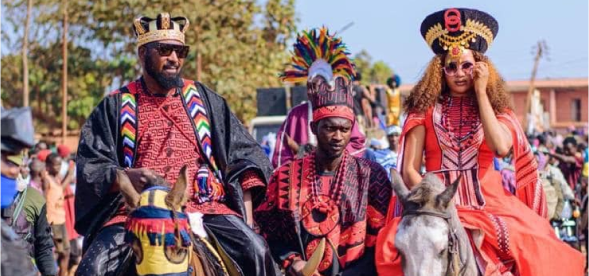
Home / History of the Idoma People
History of the Idoma People
History of the Idoma People
The Idoma people are an ethnic group primarily residing in Benue State, Nigeria, with significant populations in Taraba, Cross River, Enugu, Kogi, and Nasarawa States.
Share on:
.png)
The Idoma people are an ethnic group primarily residing in Benue State, Nigeria, with significant populations in Taraba, Cross River, Enugu, Kogi, and Nasarawa States. They speak Idoma, a language classified under the Akweya subgroup of the Idomoid languages within the Volta-Niger family, alongside related languages such as Igede, Alago, Agatu, Etulo, Ete, Akweya (Akpa), and Yala. Their homeland is located south of the Benue River, about 72 kilometers east of its confluence with the Niger River.
Historically Idomas known as warriors and hunters, the Idoma people are also recognized for their hospitality and peaceful nature. Their traditional culture remained largely intact until the 1920s, when Western influences began to emerge. The Idoma population is estimated at 3.5 million.
Historical Origin and Migration
The origins of the Idoma people are diverse and complex. Traditional oral history identifies Iduh as the father of the Idoma, whose descendants established various communities. These include:Ananawoogeno – ancestor of the Igwumale people, Olinaogwu – founder of Ugboju, Idum – founder of Adoka, Agabi – ancestor of Otukpo, Eje – founder of Oglewu, Ebeibi – ancestor of the Umogidi people of Adoka, Edeh – founder of Edumoga, Ode – ancestor of the Yala people
Despite this oral tradition, the Idoma people do not have a single, unified origin. Various communities have distinct histories, tracing their ancestry to different sources. For instance, the Otukpa people descend from three ancestors:
Owuno – Migrated from Idah in Igalaland
Ameh-Ochagbaha – Also from Igalaland
Oodo – Migrated from Igboland
Furthermore, historical migrations have resulted in some Idoma groups having Igbo origins, with significant intermarriages between the Idoma and Igbo communities.
Traditional Colour

The black and red Idoma attire, known as "Apa" or "Alekwu Ochai," symbolizes the rich cultural heritage of the Idoma people. The black color represents the earth, strength, resilience, and r everence for ancestral spirits (Alekwu), while the red signifies blood, bravery, unity, and the warrior heritage of the Idoma people. This attire is worn during important cultural events such as festivals, chieftaincy coronations, and traditional marriages. It serves as a mark of identity, unity, and respect for tradition, reflecting the Idoma people's deep connection to their history and ancestors.
Traditional Food
.png)
Okoho Soup
.png)
Okoho Soup
Okoho soup is a traditional dish of the Idoma people in Benue State, also enjoyed by the Igala, Igede, and others. Made from the Cissus populnea plant, it is known as Okoho (Idoma/Igbo/Igala), Dafara or Latutuwa (Hausa), Agara or Orogbobo (Yoruba), and Odada (Igede). The soup is slimy in texture and prepared with smoked meat, stockfish, and dry fish, typically served with pounded yam (On'ihi), making it a staple in Idoma cuisine.
Marriage
.png)
Idoma marriage rites share similarities with Igbo and other southeast traditions but have unique customs. In some Idoma subcultures, after the bride price is paid, the groom’s family presents the bride with a rooster and money on the wedding day. If she accepts, it signifies approval; if she rejects it, it shows disinterest. Though the reason for the rooster is unclear, it remains a significant and symbolic part of the ceremony.
Burial
Before Christianity, widowhood and funeral rites in Idoma culture were deeply ritualistic. A widow was subjected to several mourning customs, including drinking the water used to wash her husband's corpse to prove her innocence, shaving her head, wearing black or shabby clothes for a year, and sleeping on a mat.
Funeral rites were elaborate, ensuring the deceased transitioned properly into the spirit world. Death was classified as “good” (Eko-owoncho) or “bad” (Iku-Obobi), affecting the burial's nature. Proper rituals were believed to prevent the dead from haunting the living. The Idoma believed in an afterlife where the dead joined their ancestors. Mourning customs varied in duration based on the deceased’s social status and relationship with the mourner. Widows underwent reintegration ceremonies after mourning and could remarry, sometimes within the late husband's family.
Ancestral veneration was crucial, with deceased family members considered active spiritual participants in the living world, overseeing family affairs and ensuring prosperity.
Idoma Dialects, Locations and Spoken Languages